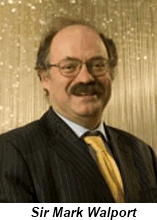|
|
|
|
|
|
|
News & Views item - April 2012 |
![]() Wellcome Trust to Launch a "High Calibre" Scientific Journal called eLife
To Compete Directly With Top Impact High Priced Publications. (April 12,
2012)
Wellcome Trust to Launch a "High Calibre" Scientific Journal called eLife
To Compete Directly With Top Impact High Priced Publications. (April 12,
2012)
 Sir
Mark Walport, the director of Wellcome Trust was reported by The Guardian's
Alok Jha on Monday as announcing that the Trust was in the final
stages" of launching a high calibre scientific journal called
eLife that would compete directly with top-tier
publications such as Nature and Science, seen by scientists as
the premier locations for publishing".
Sir
Mark Walport, the director of Wellcome Trust was reported by The Guardian's
Alok Jha on Monday as announcing that the Trust was in the final
stages" of launching a high calibre scientific journal called
eLife that would compete directly with top-tier
publications such as Nature and Science, seen by scientists as
the premier locations for publishing".
eLife will be free to view on the web immediately upon publication.
In addition the Wellcome Trust will shortly adopt "a more robust policy" to ensure that researchers it funds will have their papers made publicly available within 6-months of publication. Dr Walport's told The Guardian that in his opinion the results of public and charity-funded scientific research should be freely available to anyone who wants to read it, for whatever purpose they need it.
This past December David Willetts, UK Minister for Universities and Science, said: "We want to move to open access, but in a way that ensures that peer review and publishing continues as a function. It needs to be paid for somehow."
In Dr Walport's view: "I think publishing is a cost of research in the same way as buying a centrifuge is a cost of research. We have to maximise the public benefit of the research that we publish and we only do that by distribution."
As an indication of the strength of feeling the Wellcome Trust brings to this matter of open access Dr Walport said the Wellcome Trust was considering sanctions for researchers and universities if Wellcome-funded research is not made freely available. One option under examination is to make grant renewals contingent on open access compliance, so that new money would be released only once a scientist's previous Trust-supported work is fully accessible. In addition the Trust might require universities to confirm that papers produced with a Wellcome grant are accessible before the final instalment of that grant is paid.
He added: "If a journal won't comply with our grant conditions, then we're effectively saying [to researchers] you can't publish in that journal," and referring to the 6-month gap between publication and open access: "Frankly, it's a bit like saying you can have The Guardian free after three weeks – the news section has little value at that stage. I would say that even six months is ultimately too long for research... [Furthermore,] One of the biggest costs in the whole scientific publishing world is borne by the academic community, which is the peer review. The journals have benefited from having free, potentially very expensive consultancy. Again, why do we do that, if the end product is going to be locked behind a paywall?"
David Prosser, executive director of Research Libraries UK, told The Guardian that British universities spend around £200m a year on subscriptions to electronic databases and journals, which is around 10% of the block grants the institutions receive from government, and added that many of Britain's big universities "are spending, with some of our largest publishers, more than £1m a year each".
As regards the publishing of eLife the Wellcome Trust has teamed up with the Max Planck Society and the Howard Hughes Medical Institute.
Dr Walport said: "The idea is that that will take on the very top end of the scientific publishing industry, a visible high-profile competitor to Nature and Science. In no sense is this a war in which we're trying to put them out of business, the thing that would be best for them [publishers] to do is to change their publishing model."